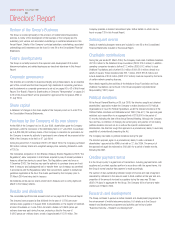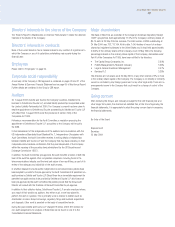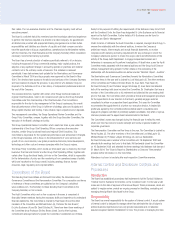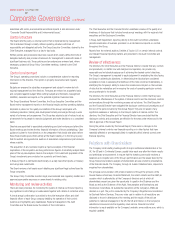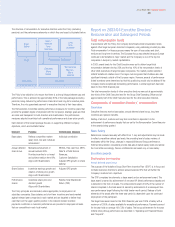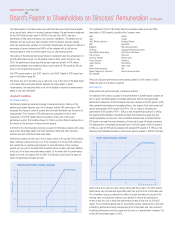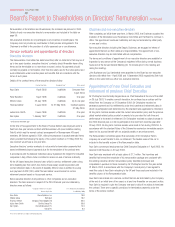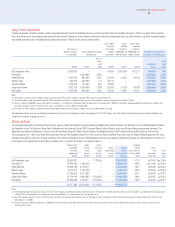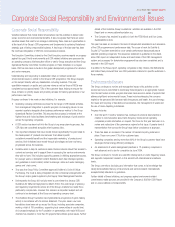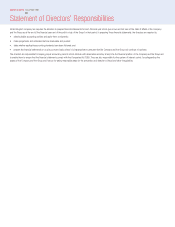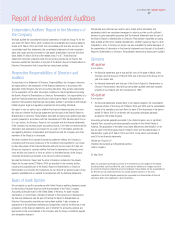Vodafone 2004 Annual Report Download - page 59
Download and view the complete annual report
Please find page 59 of the 2004 Vodafone annual report below. You can navigate through the pages in the report by either clicking on the pages listed below, or by using the keyword search tool below to find specific information within the annual report.
Sir Christopher Gent (until his retirement), Julian Horn-Smith, Ken Hydon and Peter
Bamford, being UK-based directors, are contributing members of the Vodafone Group
Pension Scheme, which is a UK scheme approved by the Inland Revenue.
This Scheme provides a benefit of two-thirds of pensionable salary after a minimum of
20 years’ service, with a contingent spouse’s pension of 50% of the member’s
pension. The normal retirement age is 60, but employees may retire from age 55 with
a pension proportionately reduced to account for their shorter service but with no
actuarial reduction. Pensions increase in payment by the lower of 5% per annum or
the maximum amount permitted by the Inland Revenue. Peter Bamford, whose
benefits are restricted by Inland Revenue earnings limits, also participates in a defined
contribution Vodafone Group Funded Unapproved Retirement Benefit Scheme (FURBS)
to enable pension benefits to be provided on his base salary above the earnings cap.
The Company makes a contribution of 30% of base salary above the earnings cap.
In respect of Vittorio Colao, a contribution is made to a defined contribution plan for
dirigenti in Italy, which includes the supplementary dirigenti contribution required
under the national collective agreements. Thomas Geitner is entitled to a defined
benefit pension of 40% of salary from a normal retirement age of 60. On early
retirement the pension may be reduced if he has accrued less than 10 years of board
service, but will not be subject to actuarial reduction. The pension increases in line
with inflation and a spouse’s pension of 60% of his pension is payable.
All the plans referred to above provide for benefits on death in service.
Further details of the pension benefits earned by the directors in the year to 31 March
2004 can be found on page 60. Liabilities in respect of the pension schemes in which
the executive directors participate are funded to the extent described in note 32 to the
Consolidated Financial Statements, “Pensions”.
Other remuneration matters
All-employee share incentive schemes
All Employee Share Plan
The Remuneration Committee has approved that an award of shares based on the
achievement of performance conditions will be made to all employees in the Vodafone
Group on 5 July 2004. This replaces previous practice of granting share options to all
Group employees. These awards have a dilutive effect of approximately 0.03%.
Sharesave Options
The Vodafone Group 1998 Sharesave Scheme is an Inland Revenue approved scheme
open to all UK permanent employees.
The maximum that can be saved each month is £250 and savings plus interest may
be used to acquire shares by exercising the related option. The options have been
granted at up to a 20% discount to market value. UK based executive directors are
eligible to participate in the scheme and details of their participation are given in the
table on page 62.
Share Incentive Plan
The Vodafone Share Incentive Plan (“SIP”) is an Inland Revenue approved plan open to
all UK permanent employees. Eligible employees may contribute up to £125 each
month and the trustee of the plan uses the money to buy shares on their behalf. An
equivalent number of shares is purchased with contributions from the employing
company. UK based executive directors are eligible to participate in the SIP and details
of their share interests under these plans are given in the table on page 63.
Non-executive directors’ remuneration
The remuneration of non-executive directors is periodically reviewed by the Board,
excluding the non-executive directors. Basic fee levels were increased in July 2003,
the previous increase having been made in 2000. An additional annual fee of £10,000
is payable for the responsibility of chairing a principal Board Committee (Audit,
Annual Report 2004 Vodafone Group Plc
57
The price at which shares can be acquired on option exercise will be no lower than the
market value of the shares on the day prior to the date of grant of the options (or than the
average of the market values for the immediately preceding month in respect of Vittorio
Colao, who is domiciled in Italy). Therefore, scheme participants only benefit if the share
price increases and vesting conditions are achieved. The Vodafone Group Plc 1999 Long
Term Stock Incentive Plan is the vehicle for the provision of these incentive awards.
In July 2003, the Chief Executive received an award of options with a face value of
eight times base salary; the Chief Operating Officer and the other executive directors
six times their base salary.
Illustration
To help shareholders understand the value of the package provided to the Chief
Executive, the following chart illustrates the approximate pre-tax long term incentive
gains to the Chief Executive that would be delivered based on various Company
growth, EPS and TSR performance scenarios. The chart illustrates that in order to gain
value from the incentive plans, considerable shareholder value must be created.
For example, if the Company’s share price increases by over 50% from 145 pence to
approximately 219 pence, the Company’s value increases by £50 billion, and there is
50% vesting of long term incentives, the Chief Executive would have a pre-tax gain of
just under £5 million, representing less than a tenth of 1% of the total increase in
shareholder value.
The awards of performance shares and share options were made to executive
directors following the 2003 Annual General Meeting on 30 July 2003. 2004 awards
will be also be made following the AGM.
Awards are delivered in the form of ordinary shares of the Company. All awards are
made under plans that incorporate dilution limits as set out in the Guidelines for Share
Incentive Schemes published by the Association of British Insurers. The current
estimated dilution from subsisting awards, including executive and all-employee share
awards, is approximately 2.1% of the Company’s share capital at 31 March 2004
(2.0% as at 31 March 2003).
Share ownership guidelines
Executive directors participating in long term incentive plans must comply with the
Company’s share ownership guidelines. These guidelines, which were first introduced
in 2000, require the Chief Executive to have a shareholding in the Company of four
times base salary and other executive directors to have a shareholding of three times
base salary.
It is intended that these ownership levels will be attained within five years from the
director first becoming subject to the guidelines and be achieved through the retention
of shares awarded under incentive plans.
Pensions
Arun Sarin is provided with a defined contribution pension arrangement to which the
Company contributes 30% of his base salary. The contribution is held in a notional
fund outside of the Company pension scheme.
0
2
4
6
8
10
12
14
100% vesting (80th percentile TSR ranking
UK RPI + 15% EPS growth per annum)
75% Vesting (73rd percentile TSR ranking &
UK RPI + 11.7% EPS growth per annum)
50% Vesting (64th percentile TSR ranking &
UK RPI + 8.3% EPS growth per annum)
25% Vesting (median TSR ranking &
UK RPI + 5% EPS growth per annum)
Growth in value of Company from grant date
+£25bn
+£50bn
+£75bn
Chief Executive Pre-Tax Gain (£ millions)



